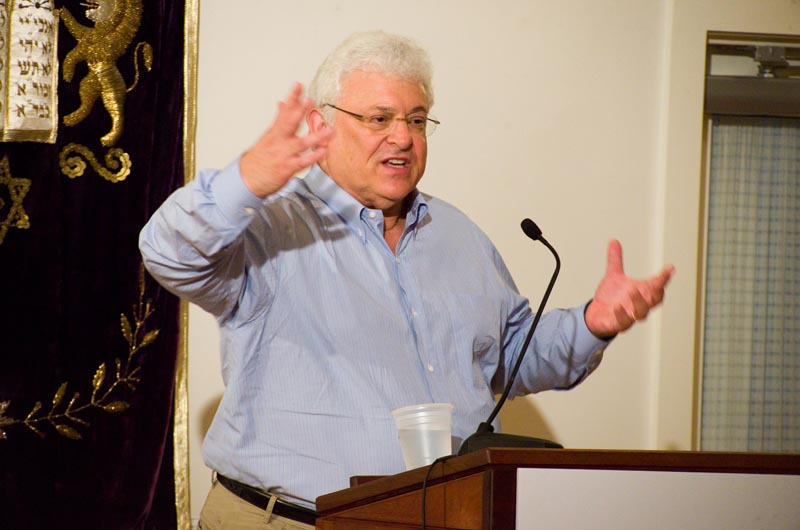Here’s a hypothetical: you’re walking down the street, casually smoking a cigarette or drinking a cup of freshly brewed coffee. Now let’s assume that you don’t discard the derelict cigarette butt in an adjacent ashtray or bin as you assuredly always do, but flick it to the ground. Perhaps the coffee container to which you pressed your lips finds itself in a wastepaper basket, lying on the top of an office graveyard littered with post-it-notes, straws and the occasional phlegm-ridden tissue. Do you mind if someone picks up these relics? What if a police officer investigating a crime scene found your used amenities and tested them for DNA? Does the police department now own your genetic information? Can it be used in court?
Bioethics. As is with any ethical and moral dilemma, discussing bioethics can be as complex as the double helix from which it originates.
“Its not hard to acquire someone’s DNA if you wanted to,” said Dr. Arthur Caplan founding head of the division for bioethics at New York University Langone Centre. “We’re shedding information everywhere we go. What concerns us is how that information is being used both for us and against us.”
On Thursday, July 11, at the Summer Institute, hosted by the Martha’s Vineyard Hebrew Center, Dr. Caplan outlined a few of the plethora of bioethical issues that have developed due to modernizations in medical studies. Dr. Caplan discussed how the mapping of the human genome shifted medical attention from a “one size fits all” approach to more individualistic practice and how this has affected the role of genetic testing.
Developments in genetic engineering have progressed to the extent that professionals in the field can not only study chromosomes which make up DNA, but separate the chromatic strands in order to read each individual base codon that makes up that chromosome. In essence, a base codon reads like a letter of the alphabet with each three-letter series describing a gene.
“We’re looking for typos in the genetic code,” explained Dr. Caplan. “Now that we can identify the typos, we’re developing a dictionary to identify what we’re finding.”
Eventually, more of these genetic misspellings will be reliably bound to a specific condition, such as cancer or an increased risk of diabetes. However, not all genetic abnormalities result in fatal consequences or mutations, Dr. Caplan said.
“Some forms of commercial genetic testing promise something like this kind of future-telling,” Dr. Caplan said. “But you need to think long and hard about peeking into your own genes to see what they hold in store for your health. It may not be so easy to cope with the bad news. And it is likely that other people could know your genetic future even if you do not consent to tell them.”
Digging into genetic testing can also become complicated in unforeseen ways.
“We had a case where a man whose father had died of Huntington’s came in to to be tested for the condition,” explained Dr. Caplan. “When the lab called me to announce that the man was not at risk for Huntington’s, it made me wonder. Why were they calling me? No one calls me to say that a patient is perfectly healthy. Turns out the test for Huntington’s not only revealed that the man who had come in was not at risk, but that the man who he had believed was his father was not related to him at all.”
The hospital was faced with two possibilities. Simply tell the patient he was not at risk for Huntington’s and omit the inadvertent discovery, or reveal to him that this father was not his father.
“If we didn’t tell him about the paternal complications, his siblings could then come in and ask for the same service, wasting their money on an expensive diagnostic test that they didn’t need.”
In the end they decided to let the paternal matter rest, but the experience prompted them to adjust their consent forms to specify what patients want to know if certain information is revealed. In either case, though, inadvertent discoveries of medical information can end up in medical files available to insurance and pharmaceutical companies.
Financial and emotional risks aside, the underlying dilemma of bioethics boils down to control, Dr. Caplan said. Who controls our genetic information? Do pharmaceutical companies have a right to patent genetic information? Do we want to know? And how should doctors approach the subject?
“Nobody passes the genetic test,” said Dr. Caplan. “In the end, we’re all mortal. What we need to fix is our lack of structure for these genetic developments. We don’t have rules about pricing and access to genetic testing. We don’t have rules about what patients are allowed to demand. We don’t have legislation about the discovery of inadvertent information.”
So how can we reconcile an individual’s right to keep personal medical information private with society’s need to use aggregate data to improve care and save money?
“Privacy issues represent some of the toughest challenges for managed care,” said Dr. Caplan. “Databases with lots of information are in private hands, and it’s uncertain how they can be used to improve quality of care and achieve better cost containment.”








Comments
Comment policy »